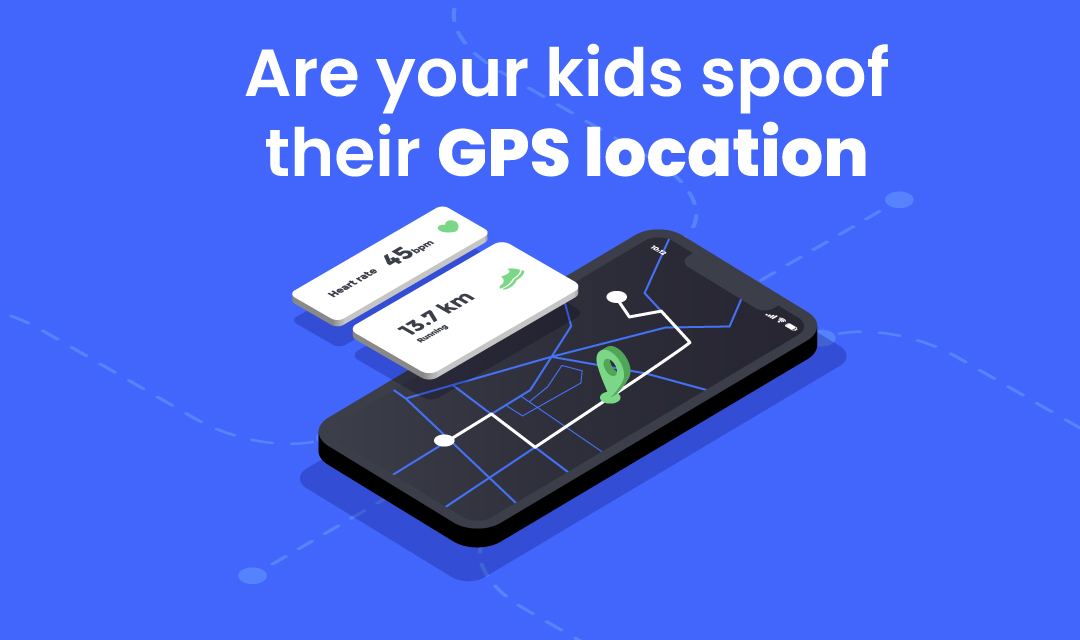
We use GPS Tracking system to navigate our cars and also use it on location-based services like Uber, Find My Phone, and Golf. GPS is used to accurately determine the location of a person, vehicle, or asset in real time. Parents use Find My (iPhone) and Find My Device (Android) along with third-party apps like Family Tracker and Find My Kids to track their child's location. Many parents and kids feel safer knowing family members' location in the event something unforeseen happens.
Not all members of a family prefer disclosing their location with the rest of the family for privacy reasons. Teens especially prefer not to let their parents know their whereabouts and found ways to spoof their smartphone location. How do you detect if your child or spouse is faking their GPS location? In this article, we'll discuss what GPS Spoofing is and how teens are spoofing their GPS location.
What is GPS Spoofing?
GPS spoofing is the deliberate manipulation of GPS signals to provide false location coordinates. It involves transmitting fake GPS signals to deceive GPS receivers, making them calculate inaccurate location data. GPS spoofing can be carried out using specialized hardware or software that generates fake GPS signals.
Individuals may spoof their GPS location to protect their privacy by concealing their actual whereabouts. This can be done with smartphone apps to maintain anonymity and provide fake geolocation data. Kids and family members can easily disguise their location by installing a smartphone app as GPS signals aren't encrypted or verified.
Is GPS Spoofing legal?
GPS spoofing is generally considered illegal in most jurisdictions when used for deceptive and harmful purposes. The specific laws and regulations regarding GPS spoofing may vary by country, so you'll have to consult the relevant laws in your location to determine its legality.
GPS Spoofing can be legal if you're using it to protect your privacy and security. Military staff may spoof their location to protect themselves from enemies. You may want to change your location settings on your phone to not let your boss or friends know that you're on vacation overseas. People have many reasons to fake their GPS location, and it will be legal in most cases.
How do you detect GPS Spoofing?
Detecting geolocation spoofing can be challenging, and there are no foolproof ways to determine if anyone is spoofing their location. However, there are some techniques that can help identify potential geolocation spoofing:
1. IP Address Analysis
Analyzing the IP address associated with a device can provide clues about its approximate location. Look for inconsistencies between the reported geolocation and the IP location provided by an IP Tracker. If you know the IP address of the device, you may use our service or API to determine the proximate location of the device.
2. Wi-Fi and Cell Tower Data
Smartphones often rely on Wi-Fi or cell tower data to determine their location. Check for anomalies in the Wi-Fi network names (SSIDs) or cell tower IDs associated with the device. Sudden jumps or inconsistencies in these data points may indicate potential spoofing.
3. Network Analysis
Examine network-related data such as latency, network hops, and routing data to identify discrepancies. Geolocation spoofing techniques often involve routing traffic through proxy servers or VPNs, which can introduce noticeable delays.
4. Behavior Analysis
Look for patterns and inconsistencies in user behaviors. For example, if a user claims to be in New York but posts photos from San Francisco on social media.
5. Inspect Device
If you have access to the device, you may inspect to see if the GPS Spoofing app has been installed. You may also check a history of app installations, so that a GPS-faking app may have been installed in the past. You may also check if Mock Location settings on Android device has been activated.
6. Contact your Wireless Provider
Most wireless providers offer features that will prevent GPS spoofing on smartphones. Check with your wireless carrier, and sign up with a plan that protects GPS signal.
Conclusion
With the popularity of smartphone apps, it's easy to spoof the GPS location of a smartphone. Detecting GPS Spoofing is not easy, and determined individuals will find ways to evade detection. Employing a combination of the above techniques and staying vigilant for suspicious behavior can increase the likelihood of identifying geolocation spoofing attempts.
Secretly tracking the location of a family member is not in the best interest of anyone. It will break the trust between family members, and it could potentially backfire another way. The best way to track an individual's location is to have a frank discussion with members and get permission from the person who is being monitored.
Share this post
Leave a comment
All comments are moderated. Spammy and bot submitted comments are deleted. Please submit the comments that are helpful to others, and we'll approve your comments. A comment that includes outbound link will only be approved if the content is relevant to the topic, and has some value to our readers.




Comments (0)
No comment